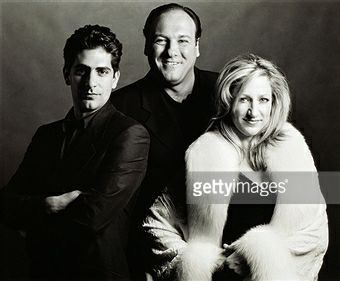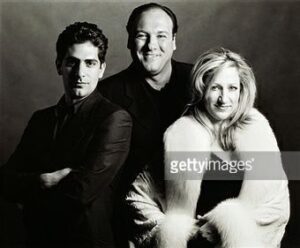
Most TV Shows Waste Their Christmas Episodes – The Sopranos Didn’t
The holiday season is a time for cozy family gatherings, festive cheer, and heartwarming TV specials. But let’s face it: more often than not, Christmas episodes of TV shows are cheap, predictable, and feel like filler. The characters act out of character, the plot feels forced, and you’re left with a sense of “Is that it?”
Then there’s The Sopranos. Unlike most shows that trot out their obligatory holiday episode with all the usual trappings, The Sopranos subverted expectations, making its Christmas episode an integral part of the show’s overarching narrative and character development. This wasn’t just a festive filler—it was a masterstroke in storytelling, character exploration, and social commentary.
Let’s dive into why The Sopranos’ Christmas episode stands apart from the rest, and how it turned the holiday season into an opportunity for dark, thought-provoking drama.
The Sopranos’ Christmas Episode: A Turning Point
The Sopranos isn’t a show about traditional holidays or happy family dinners. From the start, it redefined what TV could do, and its approach to holiday episodes was no different. In the show’s second season, the episode “The Happy Wanderer” provides a perfect example of how The Sopranos used Christmas not as an excuse for cheerful clichés, but as a backdrop for deeper, darker themes that reflected the core of the show.
A Christmas Episode with No Cheer
While many shows use Christmas to create feel-good moments—exchanging gifts, reconciling differences, and celebrating love—The Sopranos did something far more fitting for its world: it highlighted the dysfunction that Christmas often exacerbates. In this episode, we’re reminded that the holidays are just another opportunity for family conflict and personal crises. We see Tony Soprano dealing with the mounting pressures of his life, balancing family obligations with mob business, and trying to keep his emotional turmoil in check. Meanwhile, his family members are all facing their own issues—none of which are magically resolved by the holiday spirit.

This isn’t a show about the sentimental idealization of Christmas. Instead, it reminds us that holidays, especially ones like Christmas, can bring out the best and the worst in people. For Tony and his crew, Christmas is just another day in a world filled with stress, moral ambiguity, and personal demons.
Family Drama at Its Core
At the heart of The Sopranos is family. And Christmas, more than any other time of year, forces us to confront family dynamics. In “The Happy Wanderer,” the typical holiday cheer is juxtaposed with intense family conflict. Tony’s relationship with his mother, Livia, and his wife, Carmela, reflects the tension that has been building throughout the series, and the Christmas setting only intensifies it.
Livia, with her bitter and cold attitude, refuses to embrace the holiday spirit, further alienating her son Tony. Carmela, on the other hand, is trying to maintain the facade of a perfect family Christmas, even though she knows the cracks are beginning to show. This tension is palpable and serves as a crucial reminder that the show is about the complexities of family life, not the warm, fuzzy moments we typically associate with the holidays.
The Dark Side of Christmas: The Sopranos and Social Commentary
One of the hallmarks of The Sopranos is its ability to subtly weave social commentary into the narrative. And its Christmas episodes are no exception. While other TV shows might focus on the joy of gift-giving or the importance of kindness, The Sopranos explores the darker side of the holiday season—disappointment, unfulfilled expectations, and the pressure of societal norms.
The episode brings out the ways in which materialism, expectations of perfection, and family dysfunction can overshadow the supposed spirit of Christmas. For the mob family, the holiday season is just another reminder of the disparity between their public image and the turmoil within their lives. It’s the opposite of the traditional Christmas message of hope and renewal—it’s a raw reflection of the complexities of life.
The Absence of Sentimentalism: Why The Sopranos Doesn’t Need It
In a world where holiday specials are often drenched in sentimentality, The Sopranos stands in stark contrast. There’s no overwrought monologue about love and redemption, no Christmas miracle. The show doesn’t sugarcoat the holidays, nor does it attempt to make viewers feel good for the sake of tradition. Instead, it leans into the complexities of the human condition, where the holidays aren’t always a time of peace or happiness, but can also highlight personal conflict, isolation, and disillusionment.
Subverting Holiday Expectations
The Sopranos expertly subverts the typical “holiday spirit” we associate with TV episodes. Christmas in The Sopranos isn’t about happy endings; it’s about grappling with reality. For Tony, the holiday season doesn’t offer a reprieve from his troubles. Instead, it exacerbates them. He faces betrayals in his personal and professional life, and the tension of these conflicts is amplified during the supposed “most wonderful time of the year.”
This episode asks important questions about what we really want from our holiday episodes. Is it the superficial cheer of reconciliation and togetherness, or do we want something more complex—something that reflects the messiness of our real lives?
The Impact of The Sopranos’ Christmas Episode
By not falling into the trap of creating a feel-good, festive episode, The Sopranos managed to make its Christmas episode an essential part of the series. Rather than providing a distraction from the ongoing plot, it deepened the emotional stakes and provided insight into the characters’ lives. It gave the audience a chance to reflect on the things that really matter—the tension between personal desire and family loyalty, the complexities of identity, and the shadow of the past that looms over every character.
This approach had a significant impact on the future of TV holiday specials. Where many shows resorted to clichés, The Sopranos set a new standard by using the holidays as a vehicle for deeper storytelling, social commentary, and character exploration. The episode wasn’t just about Christmas—it was about everything Christmas represents, from joy to disappointment, hope to disillusionment.
A Holiday Episode That Feels Real
The power of The Sopranos’ Christmas episode lies in its ability to be brutally honest. It doesn’t shy away from the complexities of family and holiday stress, giving us an authentic portrayal of what the holiday season can sometimes feel like for people who are navigating difficult lives. In a world of Christmas clichés, The Sopranos gave us something refreshingly real.
Conclusion
In a time when TV shows often phone it in for their holiday specials, The Sopranos defied expectations and turned Christmas into a significant part of its narrative fabric. Rather than offering comfort or holiday cheer, the show’s Christmas episode explored the dark complexities of family life, emotional conflict, and the pressures of tradition. It was a masterstroke in storytelling—reminding us that sometimes, the holiday season can be just as much about unresolved tensions and unspoken truths as it is about celebration.
The Sopranos’ Christmas episode stands as a testament to the show’s commitment to subverting norms, delivering raw emotional truth, and offering a holiday experience that feels as real and relevant as anything on TV today.
FAQs
1. Why is The Sopranos’ Christmas episode so different from other TV holiday specials? Unlike other shows that offer feel-good Christmas moments, The Sopranos uses the holiday season to highlight family tension, personal conflict, and the dark side of the holidays. It offers a more realistic and complex portrayal of Christmas.
2. What makes The Sopranos’ approach to Christmas so powerful? The show’s Christmas episode delves into the complexities of family life, the pressure of societal expectations, and the emotional turmoil that can be heightened during the holiday season. It challenges the traditional notion of Christmas as a time of pure joy and offers a raw, honest depiction instead.
3. How does Christmas affect Tony Soprano’s character in the episode? In the Christmas episode, Tony is faced with both personal and professional conflicts that worsen during the holiday season. Rather than finding peace or resolution, he is confronted with the reality of his life, making the holiday a backdrop for his ongoing emotional struggles.
4. Does The Sopranos’ Christmas episode have any major plot developments? While the Christmas episode isn’t focused on major plot twists, it does deepen the character dynamics and explores ongoing tensions within the Soprano family. It’s more about emotional development than plot progression.
5. What can modern TV shows learn from The Sopranos’ Christmas episode? The Sopranos shows that holiday episodes don’t have to be predictable or sentimental. TV shows today can take a page from The Sopranos’ book and